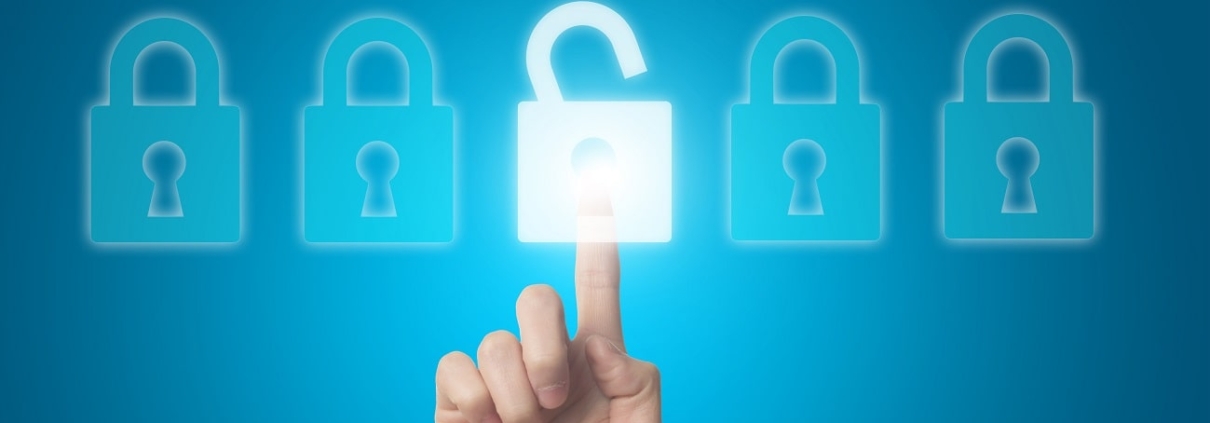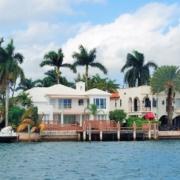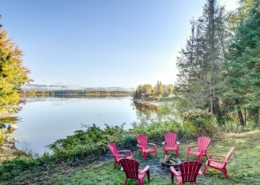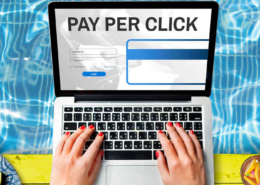Airbnb Smart Locks: A Comprehensive Guide
- What’s an Airbnb smart lock and why does every host need it?
- How to choose the right smart lock
- Best smart lock brands to consider
- Bottom line
In the U.S. alone smart locks are adopted by 9 million households, and the number is rising. Does this mean that short-term rental property owners should join the trend? Yes.
Aslo read more about smart home and automation technologies for your Airbnb business.
What’s an Airbnb smart lock and why does every host need it?
You can install any retail-available smart lock you can get from the market on your rental property: Airbnb doesn’t have policies or special requirements here. But if you consider going without this device, give it another thought. Adopting smart locks to your property management routine removes the unnecessary hassle from every rental host’s life. Key exchanges, maintenance access, and general safety will become much easier for you and your guests and team.
So let’s dive into the nature and benefits of smart locks.
What are smart locks?
Smart locks are the fusion of electronic and traditional mechanisms.
You can either fully replace your traditional lock with a smart lock or connect a smart lock to it. Some smart locks can be open with a backup physical key in addition to their digital system. From the inside, smart locks can be locked/unlocked with buttons or regular thumbturns.
How do I operate a smart lock?
Approach on the model. But most smart locks combine several unlocking methods, including:
- User codes (including one-time passwords);
- Biometry (fingertips, voice recognition, etc.);
- Mobile & web app commands;
- Geofencing (aka when a lock detects your close proximity by “sensing” your smart device).
What makes smart locks secure?
Leading brands use end-to-end encryption and their own encryption protocol. This means that any information (codes, keys, settings, etc.) transmitted between a smart lock and a device/software connected to it is a unique cipher. It isn’t stored anywhere and can’t be figured out even by the developers, much less bad actors. This is why smart locks are nearly impossible to hack.
Then there are additional security measures that vary from model to model. Developers add fingertip-proof keypads, alarms, auto-lock features, emergency sirens, built-in cameras, and more. Smart lock apps also normally store logs, so the owner can overlook the history of entries, departures, or failed unlocking attempts. Some smart locks even sync up to smart doorbells and home security systems for an additional boost of safety.
How to make a smart lock even more secure?
We recommend activating every grade of security offered by your smart lock of choice.
How do I control smart lock settings?
The majority of the best smart locks come with their own software. Here you create an account, accessible from your computer and smart devices. The majority of smart locks also work with popular virtual assistants, from Siri to Alexa, and are compatible with smart hubs like Z-Wave, Philips Hue, Wink, etc. You can use the respective apps to tweak your smart lock settings.
Some smart lock brands can be automated via property management software like Airbnb’s — more on that later in the article.
Where can I install a smart lock?
Wherever you need it to, from the front door to garage, from separate bedroom doors to kitchen cabinets.
What happens to a smart lock during power outages?
Nothing, because modern smart locks work on batteries. Those batteries can last 1-24 months, and will remotely notify you in advance if they’re running out of juice.
And while most smart locks connect to WiFi, you don’t need the Internet to operate them in person. If you or your guests have an entry key, they can simply use the lock’s physical keypad.
Are smart locks hard to install?
Not at all. Anyone who can manage a screwdriver and user-friendly software can do it in 30 minutes or less. And when in doubt, hire a trustworthy handyman to handle that.
How smart locks can make your Airbnb business easier
You can’t be glued to your property, be at a vacation rental in another country, or a shared space in your house. And you don’t have to be, because smart locks get you covered.
Self check-in
Unlike in-person key exchanges, remote access via a smart lock is easier to coordinate. Hosts can use one of the methods (or several):
- Asking guests to install a free app for the property’s smart lock. You can set up an automated message that will deliver the download link right after booking confirmation. A message like that can be sent via your Hosty app, which is integrated into your Airbnb account.
After the guest installs the app and creates an account, you will simply set up access permission for them. Thus they will be able to lock and unlock the property using the app.
- Manually creating a unique passcode for every arriving guest and sending it in advance. They will then enter the said code via keypad.
This is convenient but not ideal security-wise. Anyway, if you utilize this method, make sure to change the code immediately after they check-in.
Note: your guests don’t have to use the smart lock throughout the entire stay. You can leave a physical key or a key card inside the property in case they find this method more convenient.
Property maintenance
Managing property access for workers, delivery services, or managers can be even more hectic than for guests sometimes. Not with smart locks, however! They give property owners several options:
- Assign different access levels to team members (such as scheduled access at particular time frames and weekdays, permanent access, etc);
- Grant temporary entry codes to hired handymen, cleaning service workers, delivery, etc.;
- Send out emergency codes if needed.
Note: since smart locks usually store entry logs, the data can be used for business purposes analyzing productivity, supervising property jobs like repairs, etc.
How to choose the right smart lock
You can order smart locks online or take a trip to a store and get them there. Regardless, you must know what you’re looking for. Here’s a helpful list of tips:
- Opt for smart locks with multiple access methods. For rental property, it’s good to have a model that combines remote access with keypad entry and an additional physical keyhole.
But if you’re looking for more affordable options, skip past smart locks with fingertip access, voice recognition, or geofencing. Those features are great but not exactly essential for rental property, and models that have them are usually pricier.
The same goes for locks that require smart home hubs. Among short-term rentals, smart homes are quite rare, and your property is most likely no exception. Therefore, neither you nor your guests will be needing a smart hub-compatible lock model.
- That being said, don’t go after something too affordable. Good smart locks have a retail price starting at least $100, with a respected brand name attached to them. (Of course, the market will always have solid newcomers, and you can give their smart locks a try, but when it comes to remote property — trust companies with experience).
- Some electronic locks can’t be controlled from smartphones or computers. This, obviously, doesn’t work for self check-ins, so pick the model that supports remote access. Look for SMART locks: not just any locking device with a digital keypad.
- Make sure your phone OS is compatible with the smart lock you want to buy.
- If you want to replace a traditional lock entirely, check the door compatibility. Most smart locks have manuals, especially for this.
- Make sure your phone OS is compatible with the smart lock you want to buy.
- Check if the smart lock can be synced up with your property management software or Airbnb calendar. This makes all the property movements (like time of entry or departure) easier to follow and collect.
P.S. There are also models with check-out buttons, created with property hosts in mind.
- If you want to set up a code-based self check-in, look for smart locks with unlimited codes. Or at least with a large code combination capacity.
- Smart locks that light up are always a good idea. Airbnb guests who check-in, when it’s already dark, will greatly appreciate this feature.
- Goes without saying but after the smart lock is purchased and installed, you (and your Airbnb property manager, if there’s one) should give a thorough read to its manuals and watch excessive walkthroughs. Contemporary smart locks are practically faultless but you’d want to get the most out of them in any circumstances.
Best smart lock brands to consider
August

Price range: $229 — $290
Why we like the brand:
- August smart locks are almost ridiculously easy to install. Yet they are both very, VERY secure and intuitive. Each August model is guaranteed to have a sleek, hi-tech design.
- Very minimalist and modern design that looks almost sci-fi-like with some models. However, these smart locks are also convenient to use, so nothing is intimidating about them. The same goes for the August mobile app.
- Fast installation and programming, plus most August smart locks can be added to the existing residential lock.
- The brand also stays on par with evolving technologies, constantly introducing updates and new generations of locks.
Perks for short-term rental hosts:
- August’s smart lock software can be integrated with Airbnb (the companies are official partners). This elevates convenience: for instance, a host can list the smart locks that should be associated with a certain Airbnb property.
- Entry keys are generated for each check-in in the form of a unique code that stays valid throughout a respective stay. Guests can enter their key via the August app or the smart lock’s keypad.
- Airtight security and durability.
- Other guest options include the Invite feature where a host can select different access levels (e.g., for temporary service providers or members of the team who stop by regularly); personal codes that don’t require downloading the August app; emergency codes for immediate entry.
Notable models:
- August Wi-Fi Smart Lock;
- August Smart Lock Pro.
Kwikset
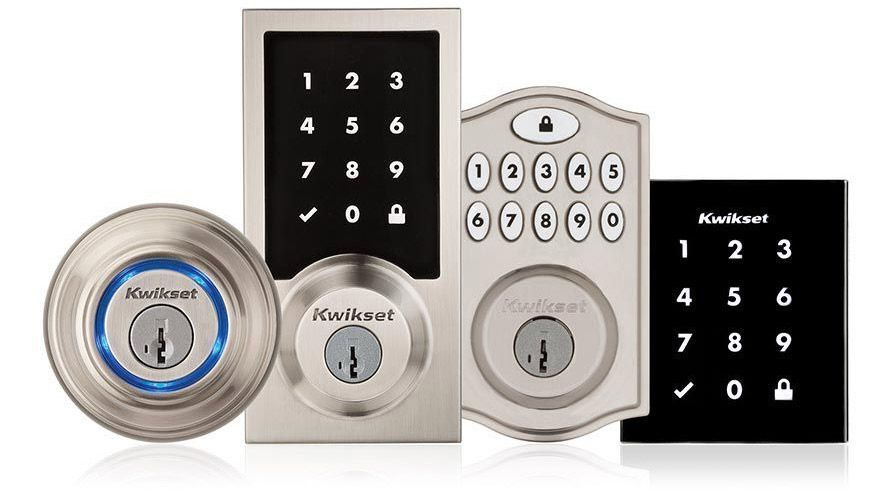
Price range: $149 — $299
Why we like the brand:
- Superior designs. Some are more straightforward, yet classy, with large stylish keypads. Others are elegant and subtle to the point where they can easily become a part of more traditional interiors. Some models are available in different finishes to be a better fit for your property’s aesthetic.
- Colored light indicators make it easier to verify the smart lock’s status (Locked, Unlocked, Out of range, etc.). The developers use LEDs, which take a lesser toll on batteries.
- Great durability and reliable, easy-to-use mobile app.
Perks for short-term rental hosts:
- Generate unique entry keys via the Kwikset app, or add guests to the smart lock. It also has a large guest key capacity and allows hosts to set up one-time access.
- Customize access dates. Using the app, a host can set up time and day for check-ins and check-outs: unique entry keys will only stay valid during that time frame. The access can also be scheduled for the maintenance team.
- Right now Kwikset can’t be integrated with an Airbnb app but it’s still widely popular among the hosts, and even has a shout-out from one of the Airbnb co-founders on its official site.
Notable models:
- Halo Touch Traditional Fingerprint Wi-Fi Enabled Smart Lock;
- Halo Aura.
Yale

Price range: $250 — $600
Why we like the brand:
- Yale shares a manufacturer with August smart locks — a Swedish company Assa Abloy. It’s one of the world’s strongest leaders in property security solutions.
- Sophisticated, slim, and discreet interior paired with user-oriented features. Some available finishes make the smart locks really versatile design-wise (like Oil Rubbed Bronze).
- Compatibility with the August app comes in handy if you use devices by both brands.
Perks for short-term rental hosts:
- Official integration with the Airbnb app, where hosts can pair property listings and their smart locks.
- Unique entry codes are generated for all guests and remain valid during their stay. A number of codes vary from model to model but can reach 250 per device.
- Guests can access the property either via the Yale app or the smart lock’s keypad (in the latter case, they receive a code via email).
- Several types of on-app access, including Recurring (e.g., a certain time frame on certain weekdays), which works great for scheduled maintenance.
Notable models:
- Yale Assure Standalone Lock;
- Yale Assure with WiFi & Bluetooth;
- Yale Assure with Touchscreen Keypad.
Igloohome
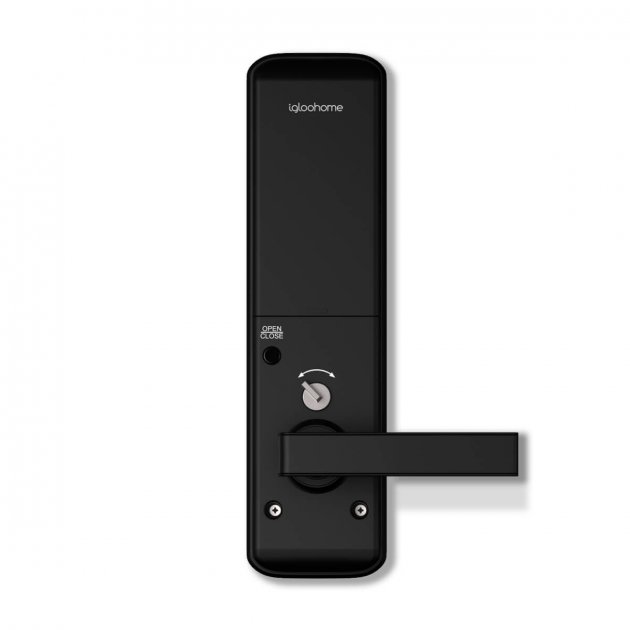
Price range: $169 — $460
Why we like the brand:
- The signature all-black design is a minimalist dream with a clean user experience. Same with the igloohome mobile and PC apps that come with smart locks.
- Nice anti-tamper and security measures, including built-in alarms or even fire detectors.
- A plethora of property models for different entry types, including gates and glass doors.
Perks for short-term rental hosts:
- Software is officially compatible with the Airbnb app, assigning a unique entry code to guests after every confirmed booking.
- An unlimited number of unique entry codes can be generated for guests.
- Entry codes can be dropped in a guest’s email account at a certain time set up by the host. The guest will only need an igloohome app and Bluetooth to operate the smart lock during their stay.
- There’s an additional layer of security as guest codes must be activated within 24 hours of the confirmed Airbnb check-in. And after the guest checks out, the code expires automatically.
Notable models:
- Igloohome Deadbolt 2S;
- Igloohome Mortise 2;
- Igloohome Rim.
Schlage
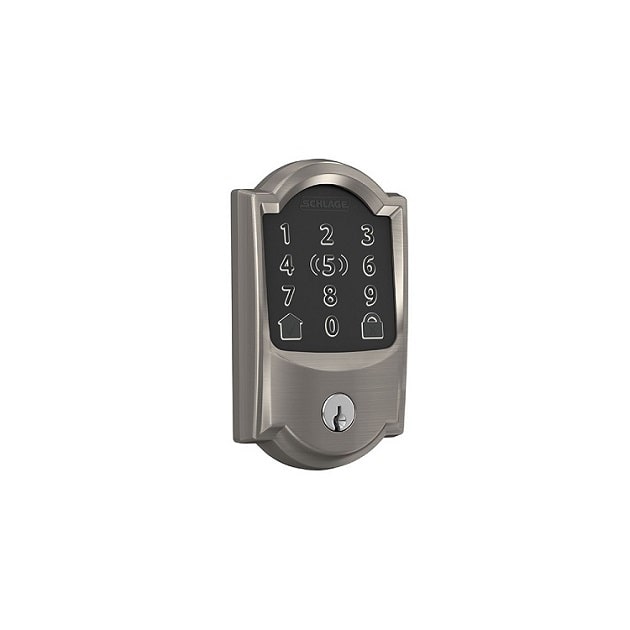
Price range: $199 — $499
Why we like the brand:
- In addition to the cutting-edge smart features, Schlage locks boast one of the strongest mechanical hardware on the market.
- A versatile portfolio of refined designs and finishes: from obsidian black contemporary style to neo-vintage chrome frame.
- One of the best mobile apps out there, with a crystal clear user interface and features, as well as little to no lagging.
Perks for short-term rental hosts:
- Hosts have to generate guest codes manually (unless they connect their Schlage smart lock to a third-party app). However, they can set up an expiration time for codes, or assign them to certain dates.
- Access codes can be put in different groups and scheduled based on who they’re assigned to.
- While not directly compatible with the Airbnb app, Schlage smart locks can be integrated with third-party apps for remote devices — and then connected to Airbnb.
Notable models:
- Schlage Encode Smart WiFi Deadbolt;
- Schlage Sense Smart Deadbolt.
Bottom line
By switching to smart locks, a modern Airbnb property owner gains a ton of advantages. This includes: remote control over property access, easy and safe self-check-ins for guests, time and money saved on key exchange services, and no more lost spare keys, ever.
Smart locks are easy to install and operate, and the best are made with short-term rentals in mind. They come with robust apps that can be integrated with property management services, including the Airbnb software. Some leading brands on the market are officially partnered with Airbnb, which makes it easier to automate virtual key distribution to guests.
Despite their user-friendly nature, smart locks are sturdy and secure, combining reliable hardware with safety measures like encryption protocols and additional features like alarms, outlook, mobile app notifications, and more.

